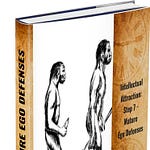Thanks for joining Dr Paul and
Fox for a talk post - Dr. Nathalie Martinek on some ongoing conversation about envy vs. jealousy and the Jungian Archetype of Han Solo and what it says about men.To have access to all the courses and the 5000+ page courtship compendium at Romantipedia, get the APP after being a Paid Member:
SHOW NOTES:
This conversation with Dr. Paul and Jeremy Fox delves into the complex emotions of envy and narcissism, particularly in the context of gender dynamics and societal expectations. The speakers explore how these emotions manifest in both men and women, using cultural references like the films 'American Psycho' and 'Bridesmaids' to illustrate their points. They also discuss the critical role of fathers in child development and the psychological implications of fatherlessness, culminating in reflections on cinematic portrayals of fatherhood and legacy.
In this segment of the podcast, Dr Paul and Jeremy return to a past event involving Jimmy Hoffa's prison cell, discussing a moment in the 1980s when Geraldo Rivera opened the cell, only to find it empty despite the buildup of anticipation. The conversation transitions to Dr. Natalie Martinek and her research into envy, which one of the hosts finds particularly intriguing.
They then dive into a discussion about the film "American Psycho," focusing on the main character's narcissism, antisocial behavior, and an early scene that highlights a tense competition among men comparing their business cards. This scene exemplifies themes of envy and masculinity, as the protagonist, played by Christian Bale, feels intense envy over the quality of another man’s business card, reflecting the broader competitive and psychopathic traits present in corporate culture.
Dr Paul and Jeremy explore the idea that envy may carry different characteristics depending on gender, suggesting that for men, envy might be linked to material wealth and success, whereas it could manifest differently for women: through the pain and desire that “exclusion from groups” or “banishment” produces. They express interest in further examining these dynamics, particularly how envy operates within various social contexts and relationships.
Overall, the dialogue weaves together cultural references and psychological themes, inviting deeper reflection on the nature of envy and its implications in personal and professional interactions.
Takeaways
Envy is a deeper emotion than jealousy, often linked to aggression.
Narcissism can prevent individuals from expressing gratitude or remorse.
Feminine envy often revolves around social exclusion rather than material wealth.
Cinematic examples like 'American Psycho' highlight toxic masculinity and envy.
Fatherlessness is correlated with negative outcomes in youth behavior.
Cultural narratives often depict the importance of wise older women.
The dynamics of envy differ between genders, with men focusing on material success.
Psychological perspectives suggest envy can be a murderous emotion.
Fatherhood plays a crucial role in shaping a child's development and self-esteem.
Cinematic portrayals of fatherhood can reflect deeper societal issues.
Sound Bites
"Envy is aggressive and murderous."
"It's wishing they cease to exist."
"Envy is deeper than just jealousy."
Chapters
00:00 The Nature of Envy and Hostility
02:30 Masculine vs. Feminine Envy
07:16 The Deadly Nature of Envy
10:43 The Role of Fathers in Emotional Development













Share this post